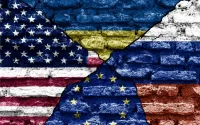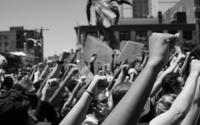Znet New Statesman ; March 19, 2004
The current threat of attacks in countries whose governments have close alliances with Washington is the latest stage in a long struggle against the empires of the west, their rapacious crusades and domination. The motivation of those who plant bombs in railway carriages derives directly from this truth. What is different today is that the weak have learned how to attack the strong, and the western crusaders' most recent colonial terrorism (as many as 55,000 Iraqis killed) exposes "us" to retaliation.
The source of much of this danger is Israel. A creation, then guardian of the west's empire in the Middle East, the Zionist state remains the cause of more regional grievance and sheer terror than all the Muslim states combined. Read the melancholy Palestinian Monitor on the internet; it chronicles the equivalent of Madrid's horror week after week, month after month, in occupied Palestine. No front pages in the west acknowledge this enduring bloodbath, let alone mourn its victims. Moreover, the Israeli army, a terrorist organisation by any reasonable measure, is protected and rewarded in the west.
In its current human rights report, the Foreign Office criticises Israel for its "worrying disregard for human rights" and "the impact that the continuing Israeli occupation and the associated military occupations have had on the lives of ordinary Palestinians".
Yet the Blair government has secretly authorised the sale of vast quantities of arms and terror equipment to Israel. These include leg-irons, electric shock belts and chemical and biological agents. No matter that Israel has defied more United Nations resolutions than any other state since the founding of the world body. Last October, the UN General Assembly voted by 144 to four to condemn the wall that Israel has cut through the heart of the West Bank, annexing the best agricultural land, including the aquifer system that provides most of the Palestinians' water. Israel, as usual, ignored the world.
Israel is the guard dog of America's plans for the Middle East. The former CIA analysts Kathleen and Bill Christison have described how "two strains of Jewish and Christian fundamentalism have dovetailed into an agenda for a vast imperial project to restructure the Middle East, all further reinforced by the happy coincidence of great oil resources up for grabs and a president and vice-president heavily invested in oil".
The "neoconservatives" who run the Bush regime all have close ties with the Likud government in Tel Aviv and the Zionist lobby groups in Washington. In 1997, the Jewish Institute for National Security Affairs (Jinsa) declared: "Jinsa has been working closely with Iraqi National Council leader Dr Ahmad Chalabi to promote Saddam Hussein's removal from office..." Chalabi is the CIA-backed stooge and convicted embezzler at present organising the next "democratic" government in Baghdad.
Until recently, a group of Zionists ran their own intelligence service inside the Pentagon. This was known as the Office of Special Plans, and was overseen by Douglas Feith, an under-secretary of defence, extreme Zionist and opponent of any negotiated peace with the Palestinians. It was the Office of Special Plans that supplied Downing Street with much of its scuttlebutt about Iraq's weapons of mass destruction; more often than not, the original source was Israel.
Israel can also claim responsibility for the law passed by Congress that imposes sanctions on Syria and in effect threatens it with the same fate as Iraq unless it agrees to the demands of Tel Aviv. Israel is the guiding hand behind Bush's bellicose campaign against the "nuclear threat" posed by Iran. Today, in occupied Iraq, Israeli special forces are teaching the Americans how to "wall in" a hostile population, in the same way that Israel has walled in the Palestinians in pursuit of the Zionist dream of an apartheid state. The author David Hirst describes the "Israelisation of US foreign policy" as being "now operational as well as ideological".
In understanding Israel's enduring colonial role in the Middle East, it is too simple to see the outrages of Ariel Sharon as an aberrant version of a democracy that lost its way. The myths that abound in middle-class Jewish homes in Britain about Israel's heroic, noble birth have long been reinforced by a "liberal" or "left-wing" Zionism as virulent and essentially destructive as the Likud strain.
In recent years, the truth has come from Israel's own "new historians", who have revealed that the Zionist "idealists" of 1948 had no intention of treating justly or even humanely the Palestinians, who instead were systematically and often murderously driven from their homes. The most courageous of these historians is Ilan Pappe, an Israeli-born professor at Haifa University, who, with the publication of each of his ground-breaking books, has been both acclaimed and smeared. The latest is A History of Modern Palestine, in which he documents the expulsion of Palestinians as an orchestrated crime of ethnic cleansing that tore apart Jews and Arabs coexisting peacefully. As for the modern "peace process", he describes the Oslo Accords of 1993 as a plan by liberal Zionists in the Israeli Labour Party to corral Palestinians in South African-style bantustans. That they were aided by a desperate Palestinian leadership made the "peace" and its "failure" (blamed on the Palestinians) no less counterfeit. During the years of negotiation and raised hopes, governments in Tel Aviv secretly doubled the number of illegal Jewish settlements on Palestinian land, intensified the military occupation and completed the fragmentation of the 22 per cent of historic Palestine that the Palestine Liberation Organisation had agreed to accept in return for recognising the state of Israel.
Along with the late Edward Said, Ilan Pappe is the most eloquent writer of Palestinian history. He is also one of the most scholarly. This combination has brought him many admirers, but also enemies among Israel's academic liberal mythologists in Britain, one of whom, Stephen Howe, was given the Pappe book to review in the New Statesman of 8 March. Howe often appears in these pages; his style is to damn with faint praise and to set carefully the limits of debate about empire, be it Irish history, the Middle East or the "war on terror". In Pappe's case, what the reader doesn't know is Howe's personal link to the Israeli establishment; and what Howe does not say in his review is that here for the first time is a textbook on Palestine that narrates the real story as it happened: a non-Zionist version of Zionism.
He accuses Pappe of "factual mistakes", but gives no evidence, then denigrates the book by dismissing it as a footnote to another book by the Israeli historian Benny Morris, who has long atoned for his own revisionist work. To its credit, Cambridge University Press has published Pappe's pioneering and highly accessible work as an authoritative history. This means that the "debate" over Israel's origins is ending, regardless of what the empire's apologists say.






